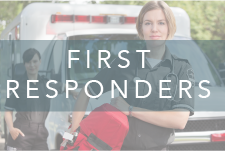How Can I Help Someone With PTSD?
- Feb 12, 2021
- 7 min read
Updated: Sep 4, 2025

The information you need to understand and support a loved one with PTSD is all here. Navigating life with someone who has experienced trauma can be difficult, but knowing what to look for and how to provide the right kind of support can make all the difference. This guide will walk you through the most important things to know.
How can I best help someone with PTSD?
The best way to help someone with PTSD is to educate yourself on the disorder, listen to their experiences without judgment, learn their specific triggers, and encourage them to seek professional treatment.
The journey to recovery from trauma is a long one, and there is much more to learn about how to be a supportive and effective ally. Keep reading to discover specific signs of PTSD and practical tips for providing the support your loved one needs.
What is PTSD and how can you effectively support a loved one who has it?
Post-traumatic stress disorder (PTSD) is a serious and debilitating disorder. Those who suffer from PTSD can find hardships in many aspects of their lives as the effects of their traumatic experiences can manifest in a number of different ways. PTSD affects many people, from those directly affected by the trauma to the loved ones doing their best to support someone with PTSD.
Living with someone who has PTSD and learning how to support someone with PTSD is difficult, but entirely possible. Those suffering from post-traumatic stress disorder will likely need a dedicated, educated kind of support who knows how to calm someone with PTSD or how to talk to someone with PTSD in a way that is supportive, productive, and cognizant of the unique trials and difficulties that traumatic experiences present each and every day.

Understanding Post-Traumatic Stress Disorder
Post-traumatic stress disorder is a mental health condition that arises from exposure to intensely traumatic experiences. Those who suffer from PTSD may have gone through several different situations, including experiences such as the loss of a loved one, witnessing natural disasters or acts of violence, being victims of physical or sexual abuse, or being the recipients of direct threats on their own life or safety. These kinds of intense traumas can alter the way in which a person views the world, making their environment seem much more pessimistic or hostile.
These traumatic experiences are unlikely to go away on their own, and thoughts and fears regarding these life-changing events may continue for many years. Overcoming this trauma and the symptoms associated with post-traumatic stress disorder is not a question of willpower — PTSD is an intense and serious mental health condition that requires the aid of professionally-trained support programs, as well as educated and supportive family members.
Recognizing Signs of PTSD
There are many different signs that can be indicative of post-traumatic stress disorder. While not every person will exhibit all of the same signs, it is still important to be ready to recognize these signs in order to know how to help a friend with PTSD.
Avoidance/Isolation: An individual may avoid places where the trauma took place, or even seem to wall themselves off from others or the world entirely, in an effort to protect themselves from further trauma.
Intrusive Thoughts or Memories: Thoughts of traumatic experiences can resurface at any time, and can impede whatever tasks an individual is looking to accomplish. Intrusive thoughts or memories can occur at any time, making it very difficult to focus.
Altered Worldview: Unique traumatic experiences can change how a person views the world, creating a more negative or pessimistic outlook that may not have been present before one’s traumatic experience.
Behavior Changes: Behavioral changes, including changes in hobbies or attitudes, can be indicative of the fundamental way in which trauma has affected the way a person processes their surroundings.
Nightmares or Flashbacks: Intense, vivid recollections of the traumatic event that can feel paralyzing and real. These can occur with or without particular triggers and can make going through regular routines incredibly difficult.
Anxiety: An increased sense of worry or distress about the world, and can make a person constantly feel “on edge” or as if they are in a constant state of danger.
Depression: A perpetual state of sadness that can feel debilitating, and even leading towards the questioning of one’s sense of self-image.
Emotional Outbursts: Trauma can make it difficult to otherwise regulate one’s emotions, leading to intense and sudden expressions of anger or frustration.
Personal Health Routines: The daily hindrances posed by various symptoms of PTSD can make it difficult to accomplish or maintain regular hygiene routines, such as showers, or keep healthy eating schedules. Eating irregular meals, or skipping them entirely, is possible.
Suicidal Ideology: The constant state of fear or pain caused by these traumatic experiences can lead a person to feel desperate to make the pain stop by any means necessary, and can even lead to suicidal thoughts in an effort to cease the pain.

Tips for Helping Someone With PTSD
Post-traumatic stress disorder is a complicated issue that requires education and a genuine sense of care. Each individual’s experience with PTSD will be different, and it is important to adapt these supportive techniques in a way that is personal to the loved one who needs the support.
Educate Yourself on PTSD: Education about PTSD can give a better understanding of the symptoms and hardships a loved one faces each day. Better knowing these issues can help inform how to help people with PTSD. It can also help inform an individual of what to say to someone with PTSD.
Listen to Them: Listening to traumatic recounts may be difficult, but it is important. Listening means making time for them to talk through the issues they face, as well as ensures that supports are not making any assumptions about another’s PTSD.
Don’t Judge: The intense, personal experience of trauma can be difficult to understand for those who have not experienced it, and knowing this means avoiding judgments on others and their actions through such a dire and intense time.
Learn Their Triggers: Paying attention to when and how an individual responds to certain stressors can inform a person of their loved one’s triggers. Knowing these can enable you to help a person better avoid these triggers in the future, as well as create a comprehensive, personalized approach to how support is offered.
Be Patient: Recovery from trauma takes a long time, and many people may have to cope with their PTSD for the rest of their lives. There is no timeframe in which a person can simply be expected to have gotten over their trauma, and being patient means setting realistic expectations for recovery. Understand that while a treatment program may end, it doesn’t mean the person’s recovery from trauma has any kind of set end-date.
Show Respect: Post-traumatic stress disorder is a difficult mental disorder that requires unique care. However, it is still important to show respect to the loved one affected by it, regardless of any kind of additional support needed.
Plan Ahead for Difficult Times: Creating a plan is important, and just because a loved one has been coping well recently doesn’t mean there can’t still be difficult times ahead. Being prepared for stressors or triggers creating new hardships is paramount for implementing a plan, and having guidance on how to address the situation.
Look Out for Warning Signs: Being vigilant for warning signs and symptoms of PTSD can enable a person suffering from PTSD, as well as their supports, to be ready to act. Each person may have their own unique warning signs, and learning these signs can help prevent unforeseen complications or unhealthy coping strategies.
Encourage Them to Seek Treatment: Providing educated support is undeniably helpful, but PTSD will also require the assistance of caring, trained professionals at treatment programs to fully explore the effects of traumatic experiences. Outlining these treatment programs as assistance for specific situations and highlighting the goals of those who suffer from PTSD for themselves can help open an individual up to the idea, and further encourage them to pursue treatment for personal reasons.
Take Care of Yourself: Providing support can be exhausting, and it is important to take as much time for yourself as you would give to another. Taking time for self-care and personal interests while providing support to others with PTSD is by no means selfish, and can lead to a better mental state as well as more effective and honest support strategies. This also helps supports avoid other complications, such as exhaustion or compassion fatigue.
Frequently Ask Questions:
• What are some common signs of PTSD?
Some common signs include avoidance, intrusive thoughts or memories, an altered worldview, changes in behavior, nightmares, anxiety, and depression.
• Is PTSD something a person can just get over with willpower?
No, PTSD is a serious mental health condition that requires professional support and educated family members, not just willpower.
• Why is it important to learn a person's triggers?
Knowing a person's triggers can help you create a personalized support plan and enable you to help them avoid situations that might cause them distress.
• How can I take care of myself while supporting someone with PTSD?
It is crucial to take time for yourself and your own interests. This helps you avoid exhaustion and compassion fatigue, leading to more effective support.
• Should I encourage my loved one to seek professional treatment?
Yes, while your support is helpful, professional assistance from trained specialists is necessary to fully explore the effects of traumatic experiences and aid in recovery.
You have already taken a powerful first step by seeking to understand how to support a loved one with PTSD. At Chateau Health and Wellness Treatment Center, we're here to walk alongside you and your family on this journey. We offer dedicated, professional treatment programs designed to help individuals overcome trauma and reclaim their lives. Please call us at (435) 222-5225 to learn how we can support you and your loved ones in finding a path forward.

About The Author
Ben Pearson, LCSW - Clinical Director
With 19 years of experience, Ben Pearson specializes in adolescent and family therapy, de-escalation, and high-risk interventions. As a former Clinical Director of an intensive outpatient program, he played a key role in clinical interventions and group therapy. With 15+ years in wilderness treatment and over a decade as a clinician, Ben has helped countless individuals and families navigate mental health and recovery challenges.
Danny Warner, CEO of Chateau Health and Wellness
Brings a wealth of experience in business operations, strategic alliances, and turnaround management, with prior leadership roles at Mediconnect Global, Klever Marketing, and WO Investing, Inc. A graduate of Brigham Young University in Economics and History, Danny has a proven track record of delivering results across diverse industries. His most transformative role, however, was as a trail walker and counselor for troubled teens at the Anasazi Foundation, where he directly impacted young lives, a personal commitment to transformation that now drives his leadership at Chateau.
Austin Pederson, Executive Director of Chateau Health and Wellness
Brings over eight years of experience revolutionizing mental health and substance abuse treatment through compassionate care and innovative business strategies. Inspired by his own recovery journey, Austin has developed impactful programs tailored to individuals facing trauma and stress while fostering comprehensive support systems that prioritize holistic wellness. His empathetic leadership extends to educating and assisting families, ensuring lasting recovery for clients and their loved ones.









